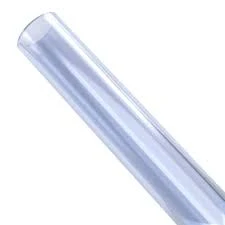Oct . 05, 2024 00:17 Back to list
cpvc tube
Understanding CPVC Pipes Advantages and Applications
Chlorinated Polyvinyl Chloride (CPVC) pipes have gained significant popularity in various industries, particularly in plumbing and construction. Known for their high durability and resistance to chemical corrosion, CPVC pipes are an excellent option for both residential and commercial applications. This article will delve into the benefits of CPVC piping and its various uses, highlighting why it is an ideal choice for modern plumbing systems.
What is CPVC?
CPVC is a thermoplastic material made by chlorinating PVC resin. This additional chlorination process imparts several desirable properties to the pipes, making them suitable for handling hot and cold water. CPVC pipes are identified by their yellowish color, which differentiates them from standard PVC pipes. They typically have a smooth interior surface that allows for effective flow and minimal friction loss.
Key Advantages of CPVC Pipes
1. High Temperature and Pressure Resistance One of the most significant benefits of CPVC pipes is their ability to withstand high temperatures. They can safely transport hot water up to temperatures of 200°F (93°C). This makes them an ideal choice for hot water plumbing and industrial applications where high temperatures are prevalent.
2. Corrosion Resistance CPVC pipes are highly resistant to corrosive chemicals and substances, unlike traditional metal pipes that can corrode over time. This feature enables them to stand up against various liquids and chemicals, making them a preferred choice for chemical processing and laboratory environments.
3. Lightweight and Easy to Install CPVC piping is lightweight compared to metal piping systems, which makes it easier to handle and install. Additionally, the joints can be welded using solvent cement, which streamlines the installation process and reduces labor costs.
4. Cost-Effectiveness Although the initial investment for CPVC pipes may be slightly higher than PVC pipes, their long lifespan and durability mean that they require less frequent replacement and maintenance. This long-term cost-effectiveness makes CPVC an attractive option for both homeowners and businesses.
cpvc tube

5. Lower Thermal Conductivity CPVC pipes have a lower thermal conductivity compared to metal pipes. This property helps maintain the temperature of the fluids inside the pipe, reducing energy costs for heated water systems.
Common Applications of CPVC Pipes
CPVC pipes are versatile and find use in a broad range of applications
- Residential Plumbing Many homeowners are choosing CPVC for their plumbing needs due to its reliability and enhanced performance in hot and cold water supply systems. - Industrial Applications In industries such as chemical processing, pharmaceuticals, and food production, CPVC pipes are utilized to transport aggressive fluids safely.
- Fire Sprinkler Systems The ability to withstand high temperatures also makes CPVC pipes a suitable choice for fire sprinkler systems, ensuring the safe transport of water in emergency situations.
- Temperature Control Systems CPVC is often used in HVAC systems to transport hot and cold fluids, playing a vital role in maintaining a comfortable climate indoors.
Conclusion
In summary, CPVC pipes offer a range of benefits including durability, resistance to corrosion, and suitability for high-temperature applications. Their lightweight nature and ease of installation enhance their appeal in both residential and industrial settings. As industries continue to seek reliable and cost-effective plumbing solutions, CPVC pipes stand out as a smart choice that meets modern standards and demands. Whether in a home or a complex industrial setup, CPVC piping provides the efficiency and reliability needed for today’s applications.
-
Durable PP Rigid Sheet: Versatile & High-Quality Plastic Panels
NewsAug.08,2025
-
Premium Glossy PP Rigid Sheet – Durable & Versatile
NewsAug.07,2025
-
High-Quality HDPE Sheet | Durable Plastic Panels
NewsAug.06,2025
-
High-Precision PVC Rigid Sheets for Vacuum Forming | AI-Optimized
NewsAug.05,2025
-
Durable PVC-M Water Supply Pipes | 60-Year Life
NewsAug.04,2025
-
Premium HDPE Water Supply Pipes: Durable & Leak-Proof
NewsAug.03,2025

